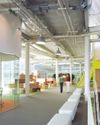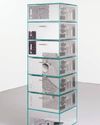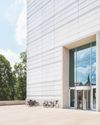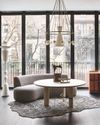
By now it’s common knowledge that we have little time to mitigate the worst effects of climate change. It’s also common knowledge that the way we make buildings, which represent about 39 percent of carbon dioxide emissions and 36 percent of energy consumption in the world, will have to change. In the United States, the increased plausibility of a Green New Deal is raising questions about how public investment can and must shape cities and buildings. How will we develop the carbon-neutral materials necessary for new construction? What will it take to retrofit all existing buildings to meet new efficiency standards? Will the building trades be onboard with all of this?
Overwhelming as these tasks might be, we can begin to make sense of them by taking stock of current sustainable building practices. Over the past ten years, LEED and other green-building certifiers have set the tenor, encouraging outcomes like high energy performance through tight building envelopes, reduced water use, connection to public transport, and the deployment of low-emission materials. These practices have become increasingly visible and celebrated, but are not necessarily common—in reality, only about 5 percent of buildings across the United States are LEED-certified. Yet even LEED standards fall well short of what’s necessary to make a building and its operations less carbon-intensive.
Diese Geschichte stammt aus der November/December 2019-Ausgabe von Metropolis Magazine.
Starten Sie Ihre 7-tägige kostenlose Testversion von Magzter GOLD, um auf Tausende kuratierte Premium-Storys sowie über 8.000 Zeitschriften und Zeitungen zuzugreifen.
Bereits Abonnent ? Anmelden
Diese Geschichte stammt aus der November/December 2019-Ausgabe von Metropolis Magazine.
Starten Sie Ihre 7-tägige kostenlose Testversion von Magzter GOLD, um auf Tausende kuratierte Premium-Storys sowie über 8.000 Zeitschriften und Zeitungen zuzugreifen.
Bereits Abonnent? Anmelden

No New Buildings
The energy already embodied in the built environment is a precious unnatural resource. It’s time to start treating it like one.

The Circular Office
Major manufacturers are exploring every avenue to close the loop on workplace furniture.

Signs of Life
Designers, curators, and entrepreneurs are scrambling to make sense of motherhood in a culture that’s often hostile to it.

Interspecies Ethic
In probing the relationship between humans and nature, two major exhibitions question the very foundations of design practice.

Building on Brand
The Bauhaus turned 100 this year, and a crop of museum buildings sprang up for the celebration.

Building for Tomorrow, Today
Radical change in the building industry is desperately needed. And it cannot happen without the building trades.

Strength from Within
Maggie’s Centres, the service-focused cancer support network, eschews clinical design to arm patients in their fight for life.

Next-Level Living
The availability of attractive, hospitality-grade products on the market means everyday consumers can live the high life at home.

Mi Casa, Su Casa
Casa Perfect creates a memorable shopping experience in lavish private homes.

Enter The Culinarium
AvroKO imagines the future of residential amenities—where convenience, comfort, and sustainability meet.